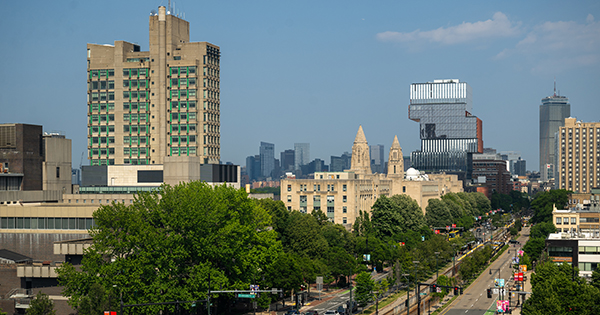Among the top fields with BU alumni were technology and Internet companies, advertising, and higher education
In its first-ever ranking of US colleges, the professional networking site LinkedIn has placed BU squarely among the 50 best institutions for prepping students for meaningful careers.
University News
Among the top fields with BU alumni are technology and internet companies, advertising, and higher education
The professional networking social media platform LinkedIn knows something about launching careers. Now, in its Top Colleges in the US, the platform’s inaugural compilation of the 50 undergraduate institutions that best prepare students for successful careers, the site is listing Boston University as 43rd on its list.
For its rankings, LinkedIn looked at almost 1,000 regionally accredited four-year undergrad programs “with the goal of identifying the undergraduate programs that best set their alumni up for long-term career success,” according to the platform. Among the top fields with BU alumni, the rankings identified technology and internet companies, higher education, and advertising.
Joseph Bizup, associate dean for undergraduate academic programs and policies at BU’s College of Arts & Sciences, suggests a primary reason behind BU’s high grade for launching students into their professional careers is the Hub. The University-wide general education curriculum is designed to teach all undergraduates essential learning capacities. The Hub “explicitly addresses precisely the kinds of capacities that become increasingly important” throughout careers, such as communication, ethical reasoning, teamwork, and creativity, says Bizup, a CAS associate professor of English.
A secondary reason, he adds, is the three-year-old Experiential Learning Connector (ELC) at CAS and its inaugural director, Erin Salius (GRS’15). The program hooks up students with BU’s many hands-on learning experiences and helps them earn course credit for internships and participate in experiential learning.
The raters used anonymized data from LinkedIn members’ profiles to measure how universities’ graduating classes from 2019 to 2024 stacked up, based on five assessment “pillars”: the percentage of alumni since 2019 who began a full-time job or graduate school degree within a year of graduating; the percentage who completed an undergraduate internship, as well as employers’ demand for a school’s alumni as interns; the percentage of alumni who have entrepreneurial or C-suite (an organization’s senior executives whose titles typically begin with the word “chief”) experience after graduation; the strength of alumni connections with each other; and unique study fields and skills racked up by recent alumni in earning their undergraduate degrees.
“As an institution,” Bizup says, “we’re committed to offering students a strong liberal education, while also positioning them, not just for their first jobs, but for meaningful and fulfilling careers.”
As an institution, we’re committed to offering students a strong liberal education, while also positioning them, not just for their first jobs, but for meaningful and fulfilling careers.
For BU’s Class of 2024, the most recent for which data are available, 62 percent had found full-time jobs by last December, while 28 percent enrolled in graduate or professional school.
Stefan Koppi, executive director of BU’s Center for Career Development (CCD), says LinkedIn’s nod “points to the highly networked environment that students experience” at BU, from the ELC to Innovate@BU, to the Undergraduate Research Opportunities Program and BU Spark!, among others.
“LinkedIn’s recognition,” Koppi adds, “highlights the value of peer education on our campus, where students serve in mentoring roles for their classmates. For example, the CCD Career Ambassador Program reaches thousands of students each year with peer-to-peer support for the transition from academia to industry.”
LinkedIn Top Colleges is the latest in the LinkedIn Lists series produced by LinkedIn News, the platform’s business news site. To be eligible for consideration, schools had to have at least 2,000 alumni, and at least 500 of those had to have graduated between 2019 and 2024. LinkedIn excluded military academies, for-profit schools, and online-only and specialized schools.

